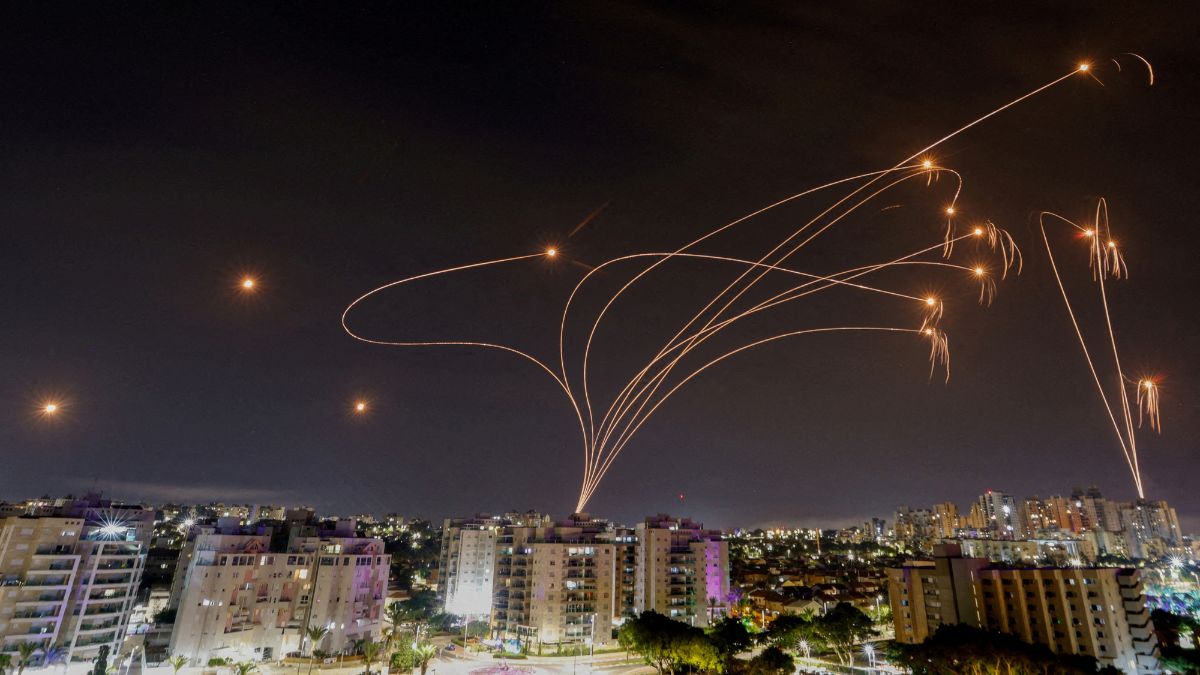To Strike Back : When and Where
"We are looking ahead.""We are considering our steps, and this launch of so many missiles, cruise missiles and UAVs into the territory of the State of Israel will be met with a response."Israel Defense Forces Chief of Staff Lt. Gen. Herzi Halevi
) |
| Israel's Iron Dome anti-missile system is seen intercepting rockets launched from the Gaza Strip | Source: Reuters |
"Iran is a nation that endorses terrorism, and the world should have curtailed it much earlier.""[Saudi air defences automatically intercept] any suspicious entity [that enters its airspace, which could refer to attacks from Yemeni Houthis, another of Iran's terror proxies].""We confront every suspicious object that enters Saudi airspace. This is a matter of sovereignty.""Two days before the attack, Iranian officials briefed counterparts from Saudi Arabia and other Gulf countries on the outlines and timing of their plan for the large-scale strikes on Israel so that those countries could safeguard airspace. Information that was passed along to the U.S. allowing Washington and Israel crucial advance warning."Anonymous Saudi royal family source
Monday
Israel's war cabinet discussed a few potential military responses to
the Islamic Republic's Saturday/Sunday attack on Israel's airspace with
over 300 drones and missiles, some 99% of which were reportedly shot
down by the U.S., Israel, France, the U.K., Jordan and Saudi Arabia
before they could enter Israel's airspace. Each of the possible
responses under discussion were designed to inflict a meaningful
response to the Iranian regime, while carefully avoiding expansion
leading to a regional war.
The
war cabinet was mindful of the pressure exerted by U.S. President Joe
Biden and the diplomatic necessity of selecting an option that would not
induce the Biden administration to block its performance. Prime
Minister Netanyahu had been informed by President Biden on Saturday not
to expect Washington to support a retaliatory attack by Israel. "You got a win. Take the win", said Biden.
Yoav
Gallant, a war cabinet member and Defence Minister, informed his
American counterpart the following evening that there was no choice for
the Jewish state but to respond to the unprecedented drone and missile
strikes on Israel in response to an alleged airstrike by Israel that hit
Damascus, killing an elite Quds Force commander. Gallant emphasized to
U.S. Secretary of Defence Lloyd Austin that the reality of ballistic
missiles fired at Israel without repercussions was not acceptable.
| Gilad Erdan, Israel's UN ambassador, showed a video of drones heading toward Israel to the United Nations Security Council on Sunday. CHARLY TRIBALLEAU via Getty Images |
In
the final analysis the war cabinet had no option but to endorse a
strike back, remaining divided on the scope and timing of their
response. Minister-without-Portfolio Benny Gantz vowed to "exact the price from Iran in the fashion and timing that is right for us". Comprised of Netanyahu, Gallant and Gantz, as well as three observers, the war cabinet meant to reconvene Tuesday.
Following
the call with Biden, it was reported that Prime Minister Netanyahu set
aside the option of a swift strike on Iranian territory; a decision that
resulted in the Iranian attacks having "caused relatively minor damage",
which seems highly unlikely, since an aggressive act of war of this
dimension could not and would not be set aside as immaterial by any
other nation on Earth.
Saudi
Arabia accused Iran of responsibility for the Gaza conflict with the
intention of undermining progress in a normalization agreement between
Riyadh and Jerusalem. A royal family source revealed that Tehran's
promotion of terrorism led Riyadh to play a role in thwarting the drone
and missile attack that occurred on Saturday night. The Saudis shared
intelligence with the United States and Israel that helped to counter
the Iranian attack.
Intelligence
was also shared by the Emiratis who had forged diplomatic ties with
Jerusalem as part of the Abraham Accords in 2020. Initially cautious
around sharing information, Arab governments feared direct involvement
in the conflict that would leave them vulnerable to Iranian reprisal.
Despite which Riyadh and Abu Dhabi moved forward following discussions
with the U.S.
As
well, Amman agreed to permit the U.S. and other countries to fly
warplanes through its airspace, intercepting Iranian missiles and
drones, while the Jordanians themselves assisted in shooting them down.
| Parts of a missile launched from a missile are landed in Marj Al-Hamam area, during Iran's airstrikes against Israel, in Amman, Jordan on April 14, 2024. Anadolu via Getty Images |
Labels: Drones and Ballistic Missiles, France, Iran Air Assault on Israel, Israeli Airspace Intact, Israeli Response, Jordan, Saudi Arabia, U.K., United States

<< Home